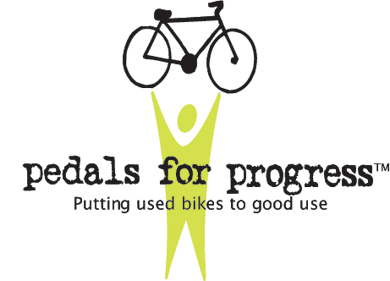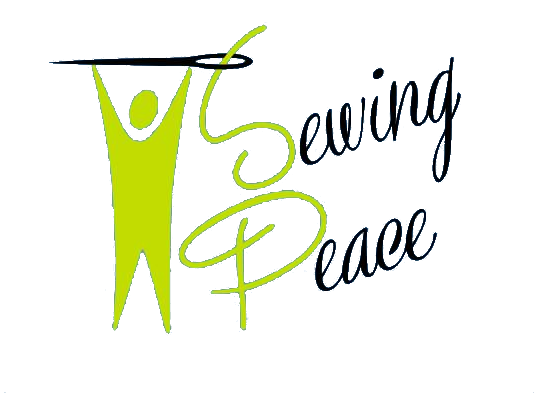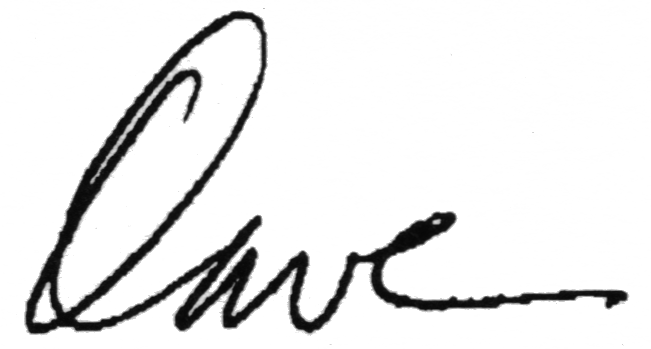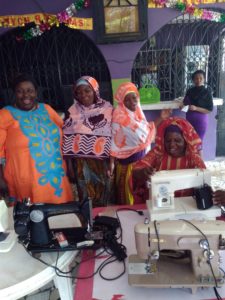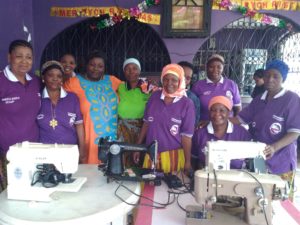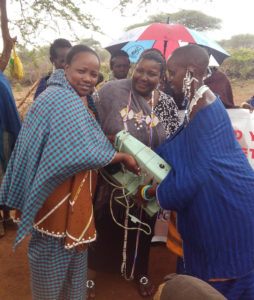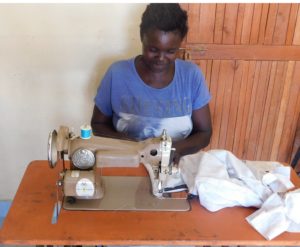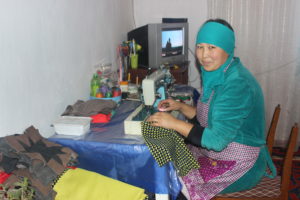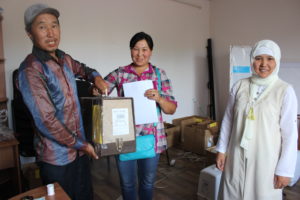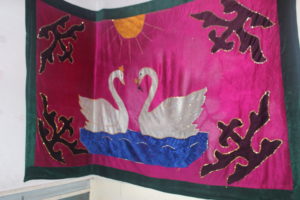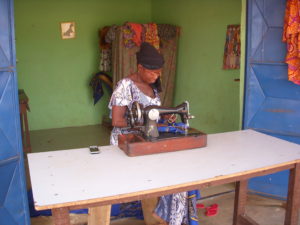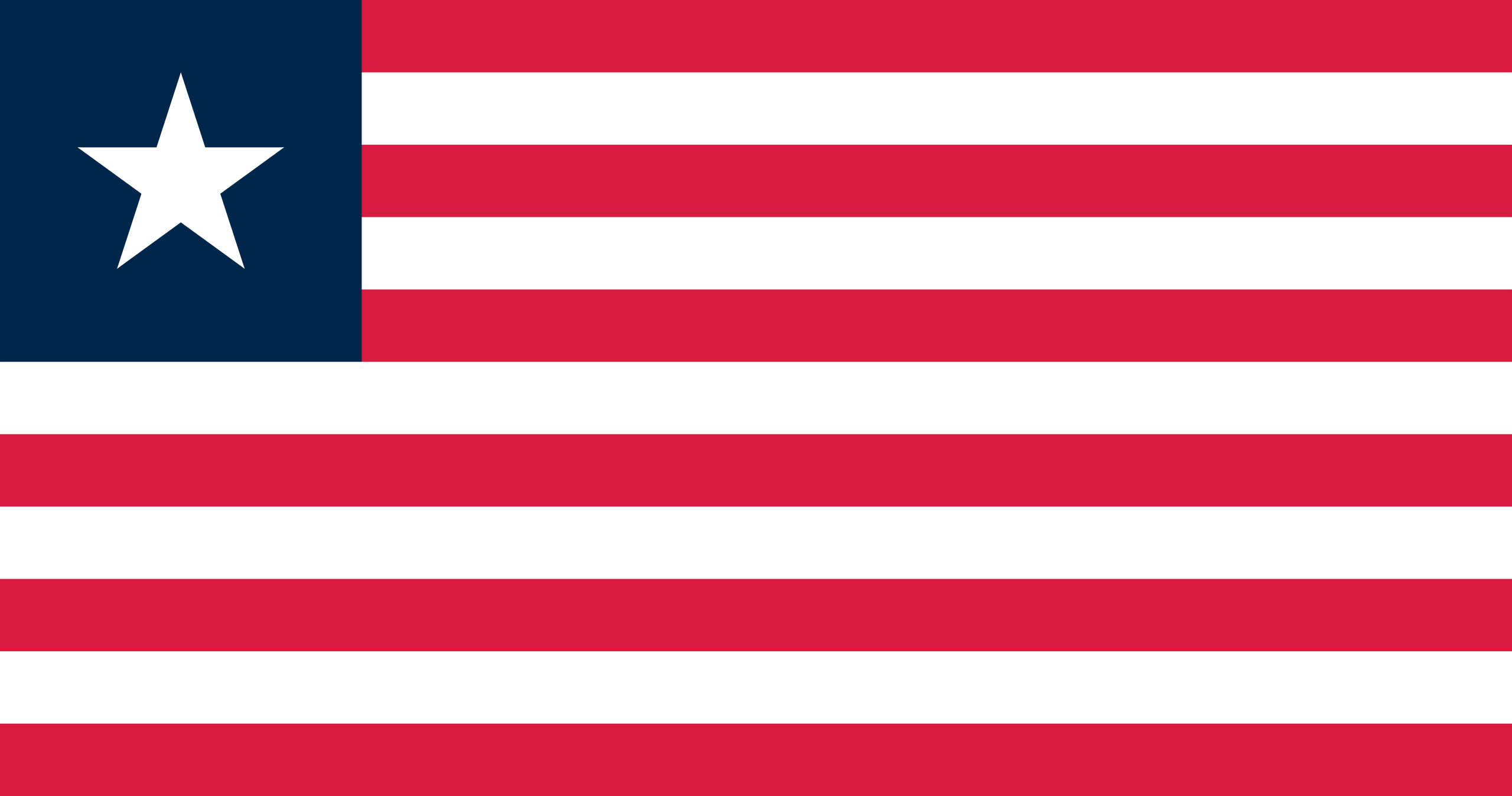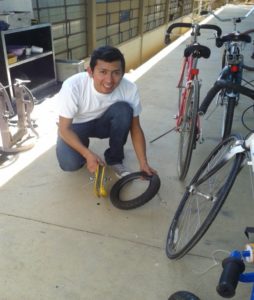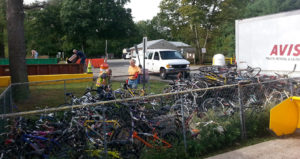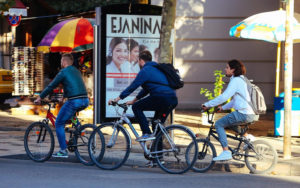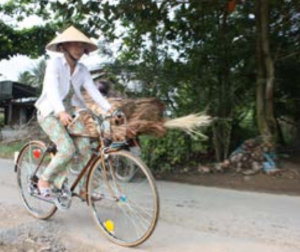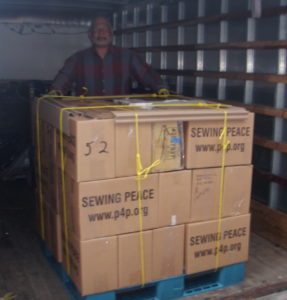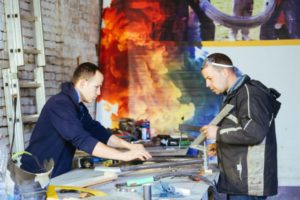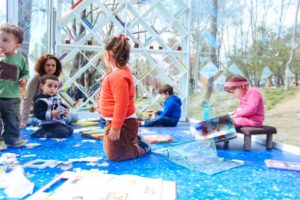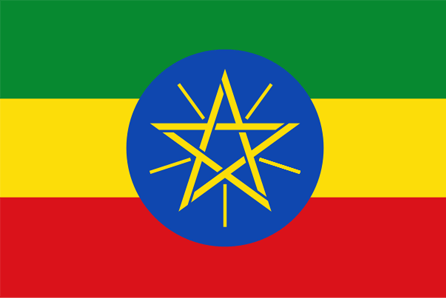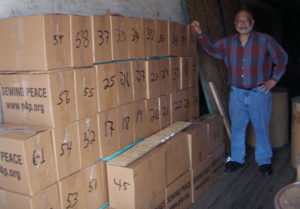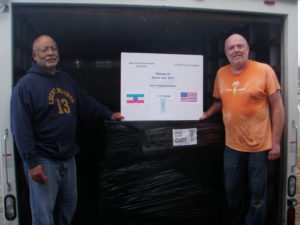
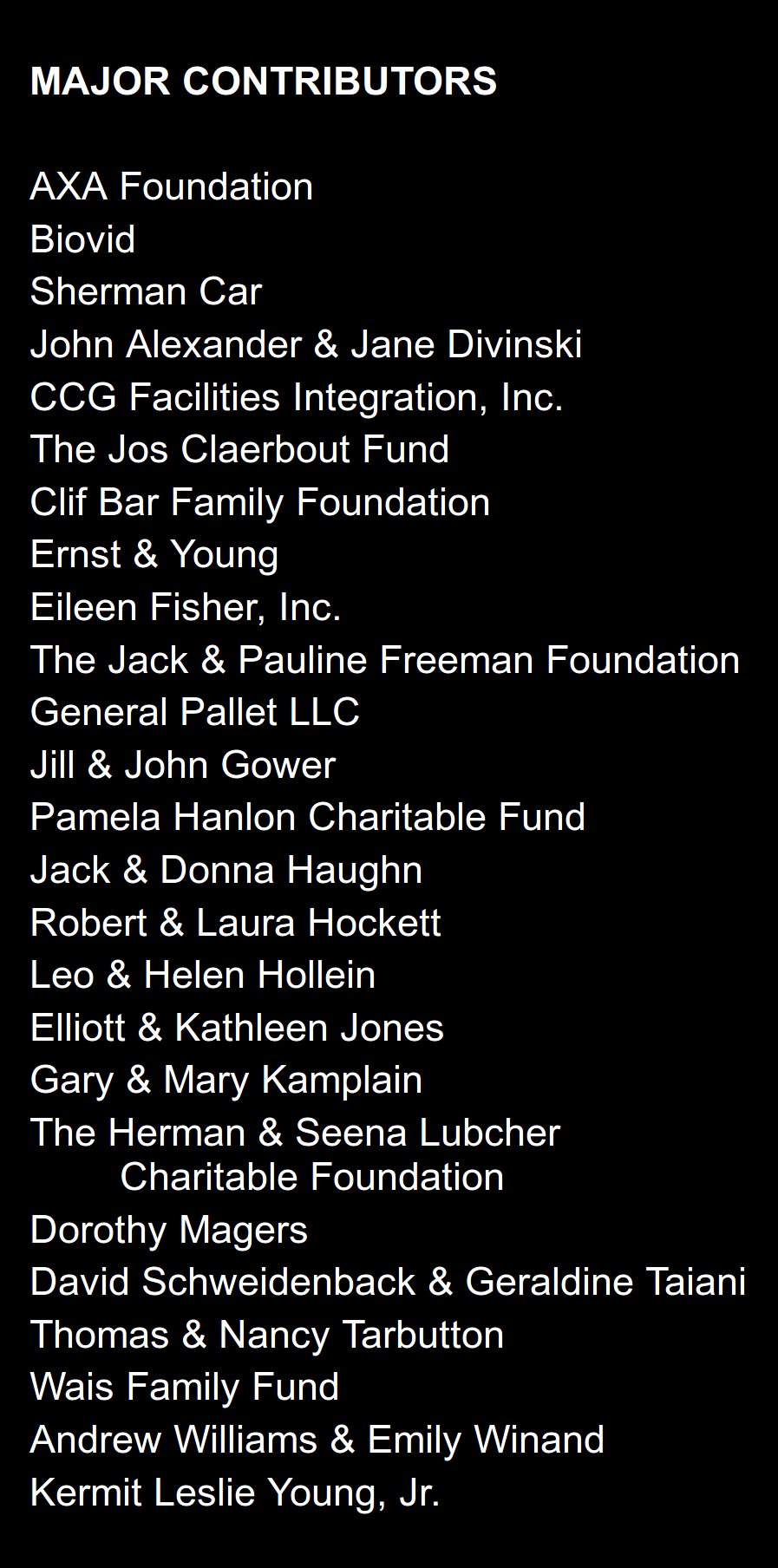
Dear Friends of P4P & SP,
Welcome to our first digital newsletter! With this format we can bring you much more information because we’re not constrained to a set number of pages. We will also save the significant cost of postage, which we can then use for our core mission of collecting and shipping income-generating potential around the world.
150,000 bikes shipped! That sure is a lot of opportunity for a heck of a lot of people, and let’s not forget the 3,700+ sewing machines we have distributed worldwide. We remain true to our original mission of proper recycling here in the U.S. for the benefit of motivated people worldwide who want a better life and are willing to work for it.
We should also give a shout out to our most amazing partners overseas, for it is those overseas partners who are responsible for the distribution. They are also responsible for finding and writing these incredible success stories that we bring you in our newsletters. We have always felt that it is important that we supply firsthand accurate stories to you the supporters of P4P so you can judge the effectiveness of our programs.
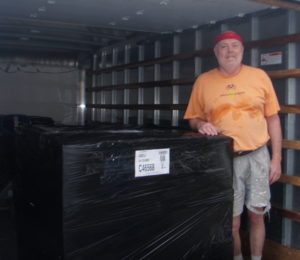
Now 26 years old, P4P has survived many turns up and down in the economy, but we have managed to stay in business because of your support. We have also managed to stay in business because of the incredible staff, some of whom right now as I write this on a Saturday in May, are standing out in the pouring rain processing bicycles. And next weekend they will be in a steel container packing those bicycles in 100º heat! P4P puts an incredible amount of sweat equity into every shipment. From Granby, Connecticut, to Gettysburg, Pennsylvania, and from Westchester, New York, down to Middletown, Delaware, our staff covers a very large domestic footprint on a shoestring budget. It is always hard physical work moving tons of bicycles but Gary always seems to do it with a smile.
I hope you enjoy both InGear and InStitch. These stories certainly inspire us to work a little harder pushing production higher so that we can offer opportunity to an increasing number of people every year.
Sincerely,
David Schweidenback
Summer 2017 InGear
In April of 2017 Pedals for Progress collected and shipped its 150,000th bicycle.
Dave Schweidenback, our founder and president, tells the story of his initial goal in 1991: ship 12 bicycles to the region of his Peace Corps service in Ecuador. His initial estimate is short, so far, by a factor of 12,500.
Our Partners
P4P has shipped to 36 countries, from Albania to Vietnam. We’ve shipped 2 bikes to Papua New Guinea and 42,672 bikes to Nicaragua. We’ve made one shipment each to India, Jamaica, Kenya, Malawi, Pakistan, Papua New Guinea, Sri Lanka, and Venezuela. We’ve made 82 shipments to Nicaragua, 40 to El Salvador, 32 to Ghana, 19 to Guatemala, and 18 to Barbados. As of June, 2017, we’ve made 378 bicycle shipments and 24 independent sewing machine shipments.
Programs end because of changes in our partner organizations, import laws and fees, bureaucracy, and sometimes outright corruption. But most countries are eager for the programs we support—the economics make sense for our partners and the bikes clearly improve the lives of the people in their communities. We always have more demand than we can fill.
As of June, 2017, our active partners with both a bicycle program and a sewing program are Albania, Ghana, Guatemala, and Nicaragua. Our active partners with sewing programs only are Ethiopia, Kenya, Kyrgyzstan, Liberia, Tanzania, and Uganda.
Choosing partners is not an exact science. Groups from around the world find us in several different ways, including the internet, magazine articles and other publications, and word of mouth. P4P has a formal procedure that potential partners use to request a shipment. They make a proposal that gives us basic information about their location, size, history, and business plan. In some cases P4P can find a way to fund a first shipment, but our business model is that the partner must pay for shipping; that payment is more evidence of their good faith.
Some of our partners we know only at a distance. Other partners we have met personally, in the U.S. and in their home countries. We have seen their kids grow up and join P4P partner businesses. We have taken terrifying auto rides with insane drivers, hiked and biked through spectacular countryside, visited their bike shops and their business, educational, and health programs. We are continuously impressed by the generosity, resourcefulness, and hard work of our partners and their communities around the world.
Bike Number 1: 1991
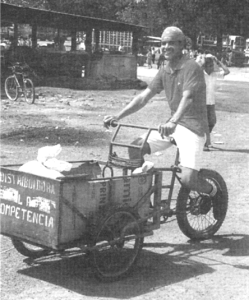
For its first couple of years, P4P shipped bikes as part of shipments from other groups. We sent our very first bikes to Nicaragua, though to a partner we no longer have.
In 1992 we made our first shipment to Rivas, Nicaragua, where Wilfredo Santana had the business that became EcoBici, which is still our partner today. In 1993 P4P started filling its own containers, and Wilfredo and Dave worked out the revolving fund idea: P4P would pay for the collection of bikes in the U.S., our partner would pay shipping costs, and the partner would make enough profit selling the bikes to pay for the next shipment.
Bike Number 50,000: 2001
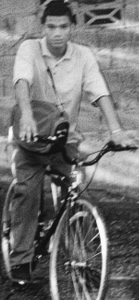
We can’t find any specific information about the 50,000th bike we shipped. Our records show that it must have been 2001. We shipped 20 containers that year, and we were nearing our peak production. In 2001 we shipped to South Africa, Honduras, Nicaragua, Barbados, Panama, El Salvador, Ecuador, and Ghana. Perhaps we were too busy collecting, prepping, and shipping bikes to notice the 50,000-bike milestone.
Let’s just pick one of our 2001 bikes and pretend that it is number 50,000. Here’s a typical happy story about how bikes improve lives: A note from Panama in our Fall 2001 InGear newsletter tells the story of seventeen-year-old Jose Luis Bethancourt, who was ready to drop out of school because of family finances. His commute to school by bus not only cost money, but took hours because of traffic, so Jose had no time for a job that would raise income for the family. He got his first-ever bike from P4P, which eliminated the bus fare and dramatically reduced his commute time. As a result, Jose had time for a job as well as for school.
Bike Number 100,000: 2006
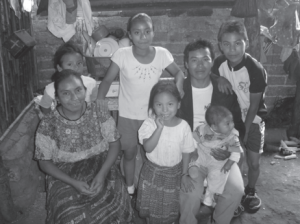
We got our 100,000th bike at a collection sponsored by the Somerset Hills Kiwanis on June 24th, 2006, at the Sunset Inn in Clinton, New Jersey. Leonard Lance, then a New Jersey State Senator, was on hand to thank the surprised donor. Now in 2017 Leonard Lance is the U.S. Congressional Representative of the New Jersey 7th District. So P4P can improve the lives of U.S. politicians as well as people in our partner countries!
We shipped the 100,000th bike to FIDESMA in Guatemala, one of our most long-standing partners. P4P’s Reykha Bonilla followed the bike to Guatemala, met our good friends and partners at FIDESMA, and met the owner of P4P bike 100,000, Mateo Patzan, a working father of 5 and amateur bike racer. The Fall 2006 InGear newsletter has the whole story of bike number 100,000.
Bike Number 150,000: 2017
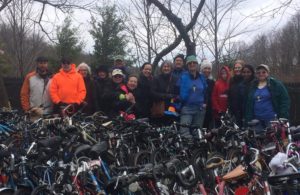
Fast forward to 2017. On April 1, the Long Island Returned Peace Corps Volunteers collected P4P bike number 150,000. On April 22 we loaded the bike into a container bound for FIDESMA, the same destination as bike number 100,000. At midday, June 6th, the bike arrived at FIDESMA in San Andrés Itzapa, Guatemala. It’s fitting that these are the groups that collected and received our 150,000th bike.
The Long Island RPCVs have been one of our most successful collection partners. They rotate collections around Long Island to maximize their reach. Their first P4P collection was in 2003, their second in 2005, and they’ve held collections every year since. The Long Island RPCVs are featured in this article from Summer 2011.
We’ve already mentioned FIDESMA, our Guatemala partner, because they got our 100,000th bike in 2006. FIDESMA has been our partner since 1999. We are good friends as well as professional partners with the principals. For example, the summer 2012 InGear newsletter has this article about a visit to New Jersey from Señora Maria Margarita Caté de Catú, founder of FIDESMA.
What’s Next
In 2016 P4P had the first uptick in bicycle collections since 2001. Let’s hope bike collections continue to improve.
Even though we are celebrating a bicycle milestone, we should mention sewing machines. Since 1999, P4P has shipped sewing machines along with bikes. Like bikes, sewing machines give people a way to improve their economic circumstances. A sewing machine can be a job in a box. In 2015 we created the Sewing Peace brand as an option for carrying on our sewing machine activities separately from our bicycle activities. If only sewing machines are involved, we have multiple advantages: with collections, with shipping, and with partnering. For collections, we can target groups more likely to have sewing machines to donate. For shipping, we can send much smaller loads, loads that do not take a full container, and so are much cheaper to ship. And for partnering, we can find groups abroad that may not have the capacity or expertise to deal with 500 bikes at a time, or that may not even have a bicycle program.
So we are now the same single organization, but doing business both as Pedals for Progress and as Sewing Peace. It’s been a rewarding 26 years. We look forward to many more.
Summer 2017 InGear
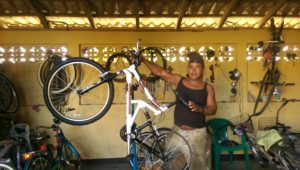 Alexander Mora was born in Tola, Nicaragua, eight miles west of the town of Rivas, home of our P4P partner EcoBici.
Alexander Mora was born in Tola, Nicaragua, eight miles west of the town of Rivas, home of our P4P partner EcoBici.
Alexander has been interested in bikes since he was 10. From a very young age he learned bike repair from Guadalupe, the former lead mechanic at the Ensembladora de Bicicletas, the EcoBici bike shop. Guadalupe taught Alexander everything about repair and maintenance of bicycles: lubrication, wheel alignment, cable replacement, …
When Alexander got his first 20-inch bike he became even more interested in bike repair.
When he was 23 an Atlas bicycle came into the shop from a Señor Miguel Ríos. Señor Rios used to deliver newspapers in Rivas on his Atlas. Señor Ríos passed away but his son gave the Atlas to Alexander. Alexander still has this bike.
After he got the Atlas, Alexander would ride it from Rivas to Tola. From Tola he would ride another five miles to the village of Gasper García to repair taxi trikes. Overall, Alexander maintains about 100 of these bike taxis.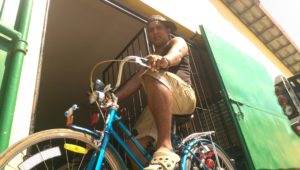
After work he would ride a few more miles to the Pacific coast for fish and whatever else he could find. To survive he would carry a machete, a liter container of water, and a pump and patches for tire-repair.
In 2011, Alexander met Joaquino Bando and they met Carlos Santana at EcoBici. They began to assemble beach cruiser bikes.
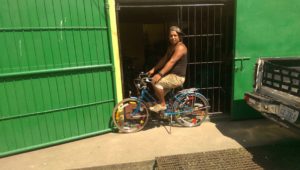
Alexander seemed different from other workers. He worked closely with Carlos. Then when head mechanic Don Lorenzo retired, Alexander joined the EcoBici permanent staff, earning a fixed salary. He works on new and used bikes, and has become one of the best bike mechanics in the country.
Alexander now restores badly damaged used bikes, making them almost like new. Besides the Atlas, he has restored a classic 24-inch bike that he uses to run errands for EcoBici: making bank deposits or doing anything else we need him to do. Alexander has great skill as a bike mechanic and has been an excellent addition to the staff at EcoBici.
Summer 2017 InGear
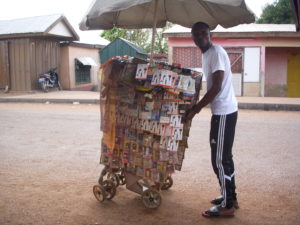 Kwame is a young man around 22 years old and a student at Cape Coast Polytechnic in Ghana. Kwame is into the business of selling Phone Cards at wholesale prices. He does this when he has no lectures to attend. Considering the tough nature of this business, he sells them by either hiring a car or walking. This mode of selling makes the work somehow cumbersome and tedious.
Kwame is a young man around 22 years old and a student at Cape Coast Polytechnic in Ghana. Kwame is into the business of selling Phone Cards at wholesale prices. He does this when he has no lectures to attend. Considering the tough nature of this business, he sells them by either hiring a car or walking. This mode of selling makes the work somehow cumbersome and tedious.
Fortunately for Kwame, he came into contact with WEBike and he purchased one of the bikes at an affordable price. He uses the bicycle for his phone-card business and sometimes to go to lectures as well because he is a non-resident student. The use of the bicycle has made his business very efficient and his customer base has increased. This is how he is able to buy more books and other personal needs. Kwame also loves to use the bicycle because of the exercise he gets riding between the campus and town.
Summer 2017 InGear
The teacher, as would be widely agreed, plays an invigorating role in the nurture of a human being. It is for this reason that teachers ought to be given apt remuneration and motivation for their services.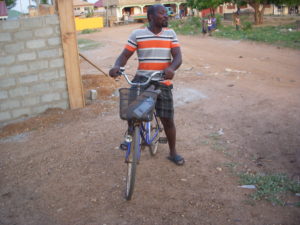
Teachers in rural areas like the Northern Region of Ghana have particular needs, and bicycles play a vital role in their lives.
A teacher who teaches up north and does not possess a bicycle is like a farmer going to the farm without a machete. Not to make a storm in a tea cup, but anyone who has lived in the rural northern part of Ghana could attest to the fact that living there can be very cumbersome.
In some places a teacher can get to school on time only by commercial bus. But in some areas the bus operates only once a day. Having a bicycle is a much more reliable means of transportation.
The bicycle is therefore invaluable in the life of the rural teacher.
Summer 2017 InGear
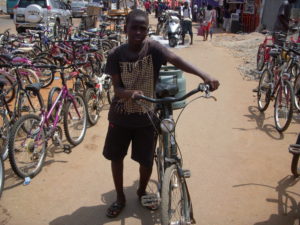
Adongo is a young energetic man who resides in the Northern Region of Ghana.
Life after secondary school was very vexatious. There were not enough funds for Adongo to continue school. Since time obviously waits for no man, he decided to use his time profitably. After much deliberation, he finally resolved to learn a trade.
Consequentially, he moved to the capital of the country, Accra, where he learned carpentry. Along the line, Adongo realized carpentry was not in his best interest. He resolved to find something else to do on the side; he met this man who was into bicycle repairs. Adongo then thought it wise to align himself with the bicycle repairer.
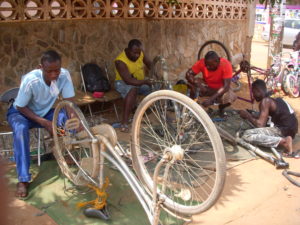 About a year and a half into bicycle repairs, he became a proficient bicycle mechanic. He handled both major and minor repairs with utmost case.
About a year and a half into bicycle repairs, he became a proficient bicycle mechanic. He handled both major and minor repairs with utmost case.
Adongo later decided to change his domicile. He went back to his roots.
He is now a big-time bicycle mechanic, with about five apprentices. He buys bicycles and gives those that are not in very good shape a decent overhaul.
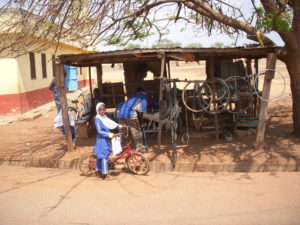
Adongo is now a competent bike mechanic cum sales executive. He is able to cater for his family and other needs. Through this business has he put up a three-bedroom house in his home town. He is living comfortably with his wife and two children.
All thanks go to WEBike.
